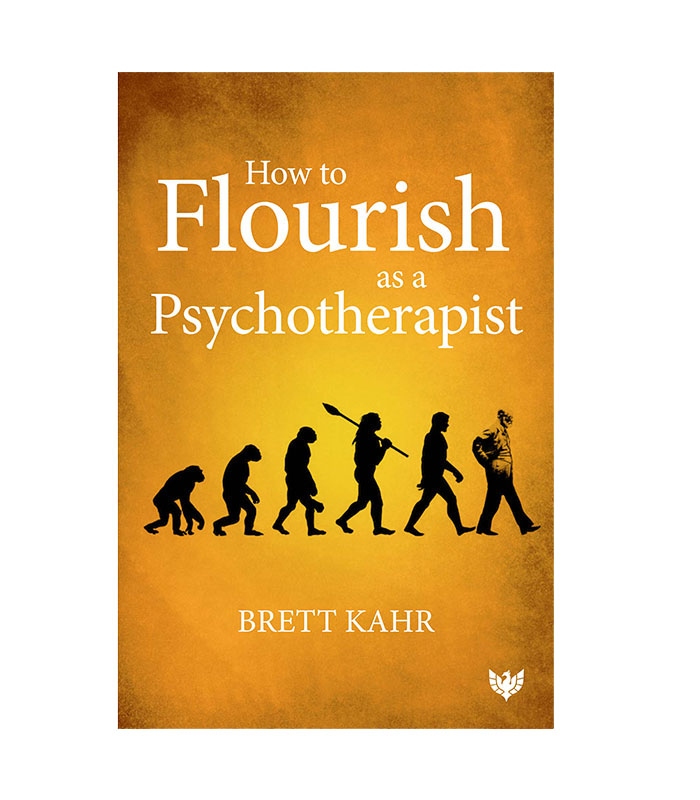About the author

Professor Brett Kahr has worked in the mental health profession for over forty years. A clinical registrant of both the British Psychoanalytic Council and the United Kingdom Council for Psychotherapy, he is Senior Fellow at the Tavistock Institute of Medical Psychology in London and, also, Visiting Professor of Psychoanalysis and Mental Health at Regent’s University London.
Over the decades, Kahr has worked in the National Health Service and in private practice in Central London with both individuals and couples. He is currently Consultant Psychotherapist to The Balint Consultancy and, additionally, Consultant in Psychology at The Bowlby Centre. He also serves as Chair of the Scholars Committee of the British Psychoanalytic Council, as well as Senior Clinical Research Fellow in Psychotherapy and Mental Health at the Centre for Child Mental Health.
Professor Kahr is the Honorary Director of Research at Freud Museum London and, also, an Honorary Fellow of the museum. Over many years, he has enjoyed the privilege of a long-standing relationship with this institution, having served as Deputy Director of the International Campaign for the Freud Museum from 1986–1987 and, more recently, as Trustee of both Freud Museum London and of Freud Museum Publications from 2011–2020.
In addition to his clinical practice, Kahr has collaborated with the media in order to promote mental health knowledge. Formerly Resident Psychotherapist on BBC2, broadcasting about mental health issues to millions of listeners, he has appeared on over one thousand radio and television programmes. In recognition of his work in this field, he has become Visiting Professor in the Faculty of Media and Communication at Bournemouth University. The United Kingdom Council for Psychotherapy recently awarded him an Honorary Fellowship for his contributions to public service.
Professor Kahr is the author of sixteen books and series editor of more than seventy-five additional titles on a wide range of subjects.
His solo-authored books cover a range of topics, including clinical investigations of extreme psychopathology and forensic mental health, such as his titles Bombs in the Consulting Room: Surviving Psychological Shrapnel and Dangerous Lunatics: Trauma, Criminality, and Forensic Psychotherapy. He has also written on Sex and the Psyche – a Waterstone’s Non-Fiction Bestseller and a chosen title in the Sunday Times Book Club – based on his study of the traumatic, unconscious roots of over 20,000 adult sexual fantasies, as well as Celebrity Mad: Why Otherwise Intelligent People Worship Fame. His historically orientated books include the very first biography of Donald Winnicott, entitled D. W. Winnicott: A Biographical Portrait, which received the Gradiva Award for Biography, as well as the popular titles, Life Lessons from Freud, Tea with Winnicott, and Coffee with Freud. Most recently, he has published Freud’s Pandemics: Surviving Global War, Spanish Flu, and the Nazis – the inaugural title in the new “Freud Museum London Series” of history books – exploring not only how Sigmund Freud navigated the tragedies of his own lifetime, but also how he would have handled the Covid-19 pandemic, and what lessons our world leaders might learn from those pioneering psychoanalytical concepts.
Kahr had the pleasure of working closely with Kate Pearce and Fernando Marques during their early careers at the old Karnac Books and is now delighted to have published his book How to Flourish as a Psychotherapist with Phoenix Publishing House.
In addition to his writing of books, Kahr also serves as Consulting Editor to The International Journal of Forensic Psychotherapy and, also, as Consultant Historian to the journal Attachment: New Directions in Psychotherapy and Relational Psychoanalysis, as well as Consultant to the Board of Couple and Family Psychoanalysis, the journal of Tavistock Relationships.






Dr David Van Nuys, Shrink Rap Radio –
I recommend it not only to students and prospective students but to therapists at whatever stage of their career they may be. You’ll find plenty of solid evidence and inspiration to deepen and expand your practice, indeed your life.
Isobel Todd, Psychodynamic Counsellor, Sussex Counselling & Psychotherapy News, Spring 2019 –
I found myself responding with enjoyment and gratitude to this book… Kahr is happy to share all he has learned the long way… [and] has a very serious point to make about the importance of deriving ‘deep delight’ from our work.
Roslyn Byfield MBACP (Accred), psychodynamic counsellor in private practice, ‘Private Practice’, June 2019 –
The book seems aimed at traditional psychoanalytic psychotherapists but its wisdom applies much more widely.
Dr M.L – 5 star Amazon Review / October 2019 –
As a newly qualified Clinical Psychologist in the NHS I found this book beyond mesmerising. The book may appear to be tailored to ‘Psychotherapists’ but all mental health professionals can benefit from the content of this book. After completing clinical training and transitioning to life as a qualified professional it can be very appealing to just ‘coast’ through working life until retirement (which may be fine for some!). In fact, after qualifying your internal resources (i.e. motivation, drive, love for work etc.) may be depleted and your enthusiasm for such a career may be dampened after the immense struggle of studying and working. However, Khar’s book is packed full of useful professional guidance and advice which can be used as a stepping stone towards truly flourishing as a mental health professional and avoid the pitfall of stagnation.
I am a huge fan of Professor Brett Kahr. I sadly only discovered Brett earlier this year! I am currently working my way through all of his books. I wish I had come across his literature during my training. Brett writes in an engaging and accessible manner and I actually really struggled to put the book down! The content may not seem as exciting as his other books (Bombs in the Consulting Room, Coffee with Freud, and Tea with Winnicott etc.) but I found myself both revitalised about the endless career development possibilities and also reassured with some of the feelings and conflicts that come associated with life as a qualified professional. The chapters focus on different endeavours that may allow someone to truly flourish as a professional as opposed to being stagnant. I will not spoil the book but topics are wide ranging and include; teaching, presenting research, writing, networking, career development, fees, office space, ageing etc.
From a personal perspective, I thoroughly enjoyed two key things about this book which I appreciate may not be for everyone’s taste; 1. Brett makes numerous references and personal anecdotes about his life and his training. I found these paragraphs probably the most enjoyable as I felt inspired by Brett’s continuous passion for new clinical projects and his enthusiasm for clinical psychology infectious. I have often been intrigued about the rigorous training of the Psychoanalytic Psychotherapist so feel privileged when Brett shares these insights. I actually hope he writes a biography about himself one day! 2.) There is a short Chapter in the book on reading. Brett recommends a series of key texts and papers that would be useful for all clinicians regardless of therapeutic orientation. However, understandably (based on Brett’s background) the recommended reading tends to focus predominantly on psychoanalytic theory. I am a huge fan of psychoanalysis and have a keen interest in psychoanalytic psychotherapy. Brett’s recommendations of reading material has allowed me to start to developed a more ‘structured’ way of reading and studying psychoanalytic ideas, theories and techniques. I feel this has been a huge bonus to me and could not be more grateful for Brett deciding to include such material. I have spent years struggling with psychoanalytic ideas – never knowing where to start.
In conclusion, beyond my enthusiasm for Brett Kahr, I highlight recommend this book from one mental health professional to another (e.g. nurse, psychologist, psychiatrist, counsellor, trainees etc.). It’s one that I will be frequently be using as a reference whenever I am feeling low on drive or enthusiasm for the job I love.
Dr M.L
Claire Hershman – 4 star Amazon Review / July 2019 –
This is a truly useful grounded look at the practically impossible but wonderful profession of being a psychotherapist. Kahr has really added a depth and enthusiasm to the training and practice.
Martin Pollecoff, psychotherapist and UKCP chair, ‘New Psychotherapist’ review –
‘This is an impressive and easy read (because it is well written and interesting) – a cradle-to-grave guide to building a successful practice – about not just surviving but “flourishing”. The book tackles all the stages of a career in psychotherapy, from choosing the most suitable course to what to do when you’re approaching retirement, and deals with real-life issues such as the envy of colleagues and back pain.’
Caroline Hallett, British Journal of Psychotherapy, 35 (2019): 655-657 –
‘… this detailed and candid book … provides the reader with a comprehensive and revealing description of how to build and maintain a successful psychotherapy practice. … In lively conversational style he offers fascinating and humorous scenarios and anecdotes from different stages of his career.’
Martin Pollecoff, psychotherapist and UKCP chair, ‘New Psychotherapist’, Spring 2019 –
‘This is an impressive and easy read (because it is well written and interesting) – a cradle-to-grave guide to building a successful practice – about not just surviving but ‘flourishing’. […] Not only did I invite Brett to join us, I bought a second copy of his book for a friend who is considering following this career path. So, think on this – greater love hath no man for a book he is reviewing than to buy two copies using money from his own pocket.’